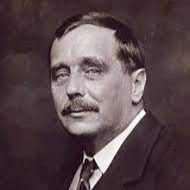A COMMENT
Jan 27, 2023

English novelist, journalist, sociologist, and historian best known for such science fiction novels as The Time Machine.
English novelist, journalist, sociologist, and historian best known for such science fiction novels as The Time Machine.
Jan 27, 2023
Nov 30, 2022
Dec 07, 2022
Dec 06, 2022
Jan 27, 2023
Nov 30, 2022
Dec 07, 2022
Dec 06, 2022